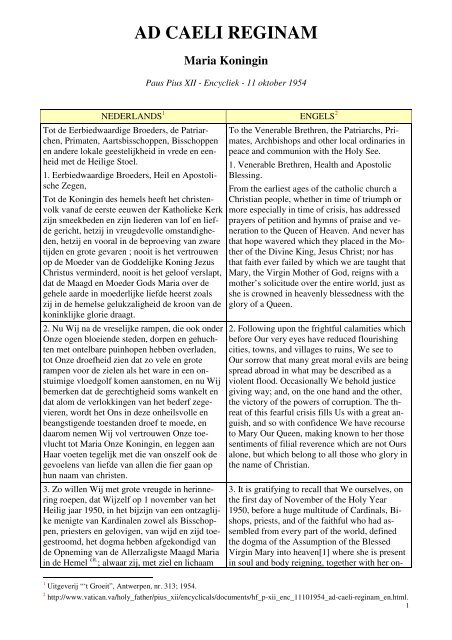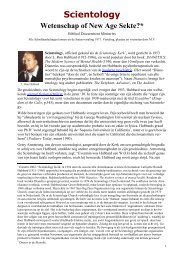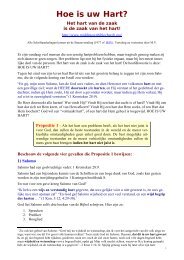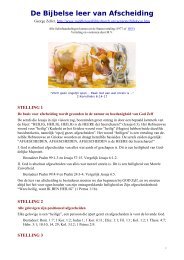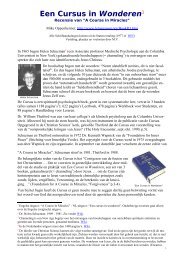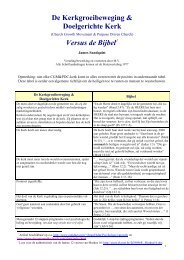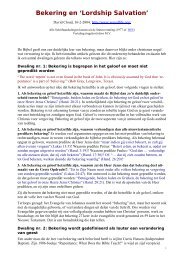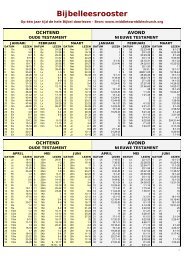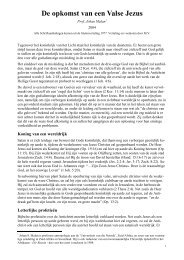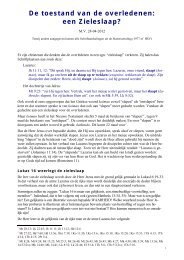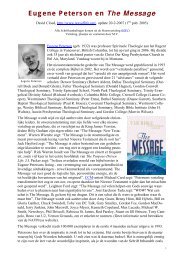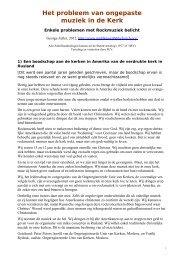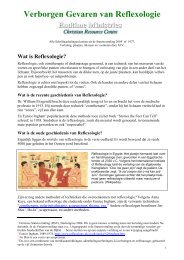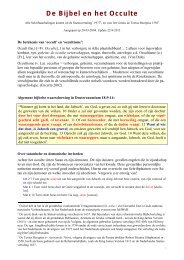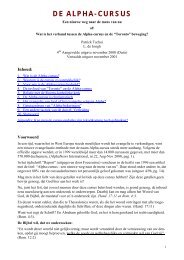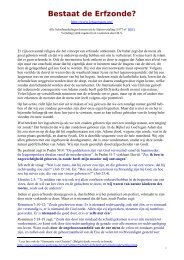Koningin des Hemels - Verhoevenmarc.be
Koningin des Hemels - Verhoevenmarc.be
Koningin des Hemels - Verhoevenmarc.be
You also want an ePaper? Increase the reach of your titles
YUMPU automatically turns print PDFs into web optimized ePapers that Google loves.
NEDERLANDS 1<br />
Tot de Eerbiedwaardige Broeders, de Patriarchen,<br />
Primaten, Aartsbisschoppen, Bisschoppen<br />
en andere lokale geestelijkheid in vrede en eenheid<br />
met de Heilige Stoel.<br />
1. Eerbiedwaardige Broeders, Heil en Apostolische<br />
Zegen,<br />
Tot de <strong>Koningin</strong> <strong>des</strong> hemels heeft het christenvolk<br />
vanaf de eerste eeuwen der Katholieke Kerk<br />
zijn smeek<strong>be</strong>den en zijn liederen van lof en liefde<br />
gericht, hetzij in vreugdevolle omstandigheden,<br />
hetzij en vooral in de <strong>be</strong>proeving van zware<br />
tijden en grote gevaren ; nooit is het vertrouwen<br />
op de Moeder van de Goddelijke Koning Jezus<br />
Christus verminderd, nooit is het geloof verslapt,<br />
dat de Maagd en Moeder Gods Maria over de<br />
gehele aarde in moederlijke liefde heerst zoals<br />
zij in de hemelse gelukzaligheid de kroon van de<br />
koninklijke glorie draagt.<br />
2. Nu Wij na de vreselijke rampen, die ook onder<br />
Onze ogen bloeiende steden, dorpen en gehuchten<br />
met ontelbare puinhopen heb<strong>be</strong>n overladen,<br />
tot Onze droefheid zien dat zo vele en grote<br />
rampen voor de zielen als het ware in een onstuimige<br />
vloedgolf komen aanstomen, en nu Wij<br />
<strong>be</strong>merken dat de gerechtigheid soms wankelt en<br />
dat alom de verlokkingen van het <strong>be</strong>derf zegevieren,<br />
wordt het Ons in deze onheilsvolle en<br />
<strong>be</strong>angstigende toestanden droef te moede, en<br />
daarom nemen Wij vol vertrouwen Onze toevlucht<br />
tot Maria Onze <strong>Koningin</strong>, en leggen aan<br />
Haar voeten tegelijk met die van onszelf ook de<br />
gevoelens van liefde van allen die fier gaan op<br />
hun naam van christen.<br />
3. Zo willen Wij met grote vreugde in herinnering<br />
roepen, dat Wijzelf op 1 novem<strong>be</strong>r van het<br />
Heilig jaar 1950, in het bijzijn van een ontzaglijke<br />
menigte van Kardinalen zowel als Bisschoppen,<br />
priesters en gelovigen, van wijd en zijd toegestroomd,<br />
het dogma heb<strong>be</strong>n afgekondigd van<br />
de Opneming van de Allerzaligste Maagd Maria<br />
in de Hemel cit. ; alwaar zij, met ziel en lichaam<br />
AD CAELI REGINAM<br />
Maria <strong>Koningin</strong><br />
Paus Pius XII - Encycliek - 11 okto<strong>be</strong>r 1954<br />
ENGELS 2<br />
To the Venerable Brethren, the Patriarchs, Primates,<br />
Archbishops and other local ordinaries in<br />
peace and communion with the Holy See.<br />
1. Venerable Brethren, Health and Apostolic<br />
Blessing.<br />
From the earliest ages of the catholic church a<br />
Christian people, whether in time of triumph or<br />
more especially in time of crisis, has addressed<br />
prayers of petition and hymns of praise and veneration<br />
to the Queen of Heaven. And never has<br />
that hope wavered which they placed in the Mother<br />
of the Divine King, Jesus Christ; nor has<br />
that faith ever failed by which we are taught that<br />
Mary, the Virgin Mother of God, reigns with a<br />
mother’s solicitude over the entire world, just as<br />
she is crowned in heavenly blessedness with the<br />
glory of a Queen.<br />
2. Following upon the frightful calamities which<br />
<strong>be</strong>fore Our very eyes have reduced flourishing<br />
cities, towns, and villages to ruins, We see to<br />
Our sorrow that many great moral evils are <strong>be</strong>ing<br />
spread abroad in what may <strong>be</strong> <strong>des</strong>cri<strong>be</strong>d as a<br />
violent flood. Occasionally We <strong>be</strong>hold justice<br />
giving way; and, on the one hand and the other,<br />
the victory of the powers of corruption. The threat<br />
of this fearful crisis fills Us with a great anguish,<br />
and so with confidence We have recourse<br />
to Mary Our Queen, making known to her those<br />
sentiments of filial reverence which are not Ours<br />
alone, but which <strong>be</strong>long to all those who glory in<br />
the name of Christian.<br />
3. It is gratifying to recall that We ourselves, on<br />
the first day of Novem<strong>be</strong>r of the Holy Year<br />
1950, <strong>be</strong>fore a huge multitude of Cardinals, Bishops,<br />
priests, and of the faithful who had assembled<br />
from every part of the world, defined<br />
the dogma of the Assumption of the Blessed<br />
Virgin Mary into heaven[1] where she is present<br />
in soul and body reigning, together with her on-<br />
1<br />
Uitgeverij “‘t Groeit”, Antwerpen, nr. 313; 1954.<br />
2<br />
http://www.vatican.va/holy_father/pius_xii/encyclicals/documents/hf_p-xii_enc_11101954_ad-caeli-reginam_en.html.<br />
1
tegenwoordig, onder de koren van Engelen en de<br />
heilige Hemelingen heerst te zamen met Haar<br />
Eengeboren Zoon. En toen het, vervolgens, een<br />
eeuw geleden was, dat Onze Voorganger onsterfelijker<br />
gedachtenis, Pius IX, <strong>be</strong>krachtigde en als<br />
dogma afkondigde dat de Allerhoogste Moeder<br />
Gods zonder enige smet van erfzonde was ontvangen,<br />
heb<strong>be</strong>n Wij het nu lopende Maria-jaar<br />
ingesteld cit. en nu zien Wij, tot grote troost voor<br />
Ons vaderhart, dat niet alleen in deze gezegende<br />
stad - met name vooral in de Li<strong>be</strong>riaanse Basiliek<br />
cit. , waar een ontelbare menigte overduidelijk<br />
getuigenis aflegt van hun geloof en van hun allervurigste<br />
liefde jegens hun <strong>Hemels</strong>e Moeder -<br />
maar eveneens in alle delen van de wereld de<br />
liefde tot de Maagd en Moeder Gods geleidelijk<br />
weer opbloeit en dat talrijke <strong>be</strong>devaarten van<br />
christengelovigen naar de voornaamste Mariaheiligdommen<br />
zijn getrokken en nog steeds blijven<br />
trekken.<br />
4. Verder is het algemeen <strong>be</strong>kend dat Wij, telkens<br />
wanneer de gelegenheid daartoe zich voordeed,<br />
namelijk als Wij Onze kinderen in Christus<br />
op een audi”entie heb<strong>be</strong>n toegesproken, of als<br />
Wij via de radio ook tot ver verwijderde volkeren<br />
het woord heb<strong>be</strong>n gericht, allen die Wij maar<br />
konden aansporen, ook heb<strong>be</strong>n aangespoord om<br />
Onze allermilddadigste en allermachtigste Moeder<br />
met een, zoals aan kinderen <strong>be</strong>taamt, vurige<br />
en tedere liefde te <strong>be</strong>minnen. Hierin willen Wij<br />
speciaal herinneren aan de radioboodschap die<br />
Wij tot het volk van Portugal heb<strong>be</strong>n gericht,<br />
toen het <strong>be</strong>eld van de wonderdadige Maagd Maria,<br />
dat te Fatima wordt vereerd met een gouden<br />
diadeem werd gekroond cit. , en wie wijzelf de<br />
boodschap van Maria’s Koningschap heb<strong>be</strong>n<br />
genoemd. cit<br />
5. Om dus deze talrijke <strong>be</strong>wijzen van onze liefde<br />
jegens de grote Moeder Gods, waaraan het<br />
christenvolk met zoveel vuur heeft meegedaan,<br />
als het ware te <strong>be</strong>kronen, tevens om het Mariajaar<br />
dat reeds ten einde loopt, een gelukkig en<br />
veel<strong>be</strong>lovend slot te geven, en om aan de dringende<br />
verzoeken die Ons hieromtrent van alle<br />
delen van de wereld heb<strong>be</strong>n <strong>be</strong>reikt, met vreugde<br />
gevolg te geven, heb<strong>be</strong>n Wij <strong>be</strong>sloten het liturgisch<br />
feest in te stellen van de Heilige Maagd<br />
Maria <strong>Koningin</strong>.<br />
6. Hiermede willen Wij geen nieuwe waarheid<br />
aan het christenvolk te geloven voorhouden,<br />
aangezien in feite de grond en de redenen waarop<br />
de koninklijke waardigheid van Maria steunt,<br />
reeds te allen tijde overduidelijk zijn uitgedrukt<br />
en gevonden worden in de vanoudsher overgele-<br />
ly[1a] Son, amid the heavenly choirs of angels<br />
and Saints. Moreover, since almost a century has<br />
passed since Our predecessor of immortal memory,<br />
Pius IX, proclaimed and defined the dogma<br />
that the great Mother of God had <strong>be</strong>en conceived<br />
without any stain of original sin, We instituted<br />
the current Marian Year[2] And now it is<br />
a great consolation to Us to see great multitu<strong>des</strong><br />
here in Rome - and especially in the Li<strong>be</strong>rian<br />
Basilica - giving testimony in a striking way to<br />
their faith and ardent love for their heavenly<br />
Mother. In all parts of the world We learn that<br />
devotion to the Virgin Mother of God is flourishing<br />
more and more, and that the principal<br />
shrines of Mary have <strong>be</strong>en visited and are still<br />
<strong>be</strong>ing visited by many throngs of Catholic pilgrims<br />
gathered in prayer.<br />
4. It is well known that we have taken advantage<br />
of every opportunity - through personal audiences<br />
and radio broadcasts - to exhort Our children<br />
in Christ to a strong and tender love, as <strong>be</strong>comes<br />
children, for Our most gracious and exalted<br />
Mother. On this point it is particularly fitting to<br />
call to mind the radio message which We addressed<br />
to the people of Portugal, when the miraculous<br />
image of the Virgin Mary which is venerated<br />
at Fatima was <strong>be</strong>ing crowned with a golden<br />
diadem.[3] We Ourselves called this the heralding<br />
of the "sovereignty" of Mary.[4]<br />
5. And now, that We may bring the Year of Mary<br />
to a happy and <strong>be</strong>neficial conclusion, and in<br />
response to petitions which have come to Us<br />
from all over the world, We have decided to institute<br />
the liturgical feast of the Blessed Virgin<br />
Mary, Queen. This will afford a climax, as it<br />
were, to the manifold demonstrations of Our<br />
devotion to Mary, which the Christian people<br />
have supported with such enthusiasm.<br />
6. In this matter We do not wish to propose a<br />
new truth to <strong>be</strong> <strong>be</strong>lieved by Christians, since the<br />
title and the arguments on which Mary’s queenly<br />
dignity is based have already <strong>be</strong>en clearly set<br />
forth, and are to <strong>be</strong> found in ancient documents<br />
of the Church and in the books of the sacred li-<br />
2
verde documenten van de Kerk en in de boeken<br />
van de heilige liturgie.<br />
7. Aan dit alles willen Wij nu door deze Encycliek<br />
herinneren, om de lof van Onze hemelse<br />
Moeder te hernieuwen en om niet zonder vrucht<br />
voor hun geestelijk leven in de harten van allen<br />
een vuriger liefde jegens haar te doen opleven.<br />
8. Ook in lang vervlogen tijden heeft het christenvolk<br />
met recht geloofd, dat Zij, uit wie de<br />
Zoon van de Allerhoogste geboren is, die “Koning<br />
zal zijn over het huis van Jacob in eeuwigheid”<br />
(Luc. 1, 32), de “Vorst van de vrede.”(Jes.<br />
9, 6), de “Koning der koningen en de Heer der<br />
heren” (Apoc. 19, 16), boven alle andere schepselen<br />
van God bijzondere genadevoorrechten had<br />
ontvangen. En als het dan dacht aan de nauwe<br />
band die er <strong>be</strong>staat tussen moeder en kind, heeft<br />
het de koninklijke verhevenheid van de Moeder<br />
Gods boven alles zonder moeite aanvaard.<br />
9. Daarom <strong>be</strong>hoeft het niemand te verwonderen<br />
dat, steunend op de woorden van de H. Aartsengel<br />
Gabri”el, die het eeuwige koningschap van<br />
de Zoon van Maria voorzegde cit. , en op de<br />
woorden van Elisa<strong>be</strong>th, die haar eerbiedig groetend<br />
heeft verheerlijkt als de “Moeder van mijn<br />
Heer” (Lc. 1, 43), reeds de schrijvers van de<br />
oude Kerk Maria Moeder van de Koning, Moeder<br />
van de Heer heb<strong>be</strong>n genoemd, waarmee zij<br />
duidelijk <strong>be</strong>doelden, dat Maria aan de koninklijke<br />
waardigheid van Haar Zoon een eigen en <strong>be</strong>voorrechte<br />
plaats heeft ontleend.<br />
10. H. Ephraem, met de gloed van dichterlijke<br />
inspiratie, spreken : “Dat de hemel mij torse door<br />
zijn omarming, omdat ik meer ge”eerd <strong>be</strong>n dan<br />
hij. Want de hemel was u Moeder; maar tot uw<br />
troon hebt gij hem gemaakt. Hoe eervoller en<br />
lofwaardiger is de Moeder van de Koning dan<br />
troon” cit. . En elders bidt gij zo tot haar : “... verheven<br />
Maagd en Meesteres, <strong>Koningin</strong>, Vorstin,<br />
<strong>be</strong>scherm en <strong>be</strong>waar mij onder uw vleugels, opdat<br />
Satan de verderfzaaier zich niet tegen mij<br />
verheft, noch de boze vijand in de strijd tegen<br />
mij overwint” (S. ephraem, Oratio ad Ssmam<br />
Dei Matrem; Opera omnia, Ed. Assemani, t. III<br />
(graece), Romae, 1747, pag. 546 cit.<br />
11. Door de H. Gregorius van Nazianze wordt<br />
Maria genoemd “Moeder van de koning van hemel<br />
en aarde”, “Moeder Maagd, die de koning<br />
van de gehele wereld heeft gebaard” cit. . Prudentius<br />
verzekert dat de moeder zich verwondert,<br />
“dat Zij God als mens heeft voortgebracht, en<br />
ook als hoogste koning” cit.<br />
turgy.<br />
It is Our pleasure to recall these things in the<br />
present encyclical letter, that We may renew the<br />
praises of Our heavenly Mother, and enkindle a<br />
more fervent devotion towards her, to the spiritual<br />
<strong>be</strong>nefit of all mankind.<br />
8. From early times Christians have <strong>be</strong>lieved,<br />
and not without reason, that she of whom was<br />
born the Son of the Most High received privileges<br />
of grace above all other <strong>be</strong>ings created by<br />
God. He "will reign in the house of Jacob forever,"[5]<br />
"the Prince of Peace,"[6] the "King of<br />
Kings and Lord of Lords."[7] And when Christians<br />
reflected upon the intimate connection that<br />
obtains <strong>be</strong>tween a mother and a son, they readily<br />
acknowledged the supreme royal dignity of the<br />
Mother of God.<br />
9. Hence it is not surprising that the early writers<br />
of the Church called Mary "the Mother of the<br />
King" and "the Mother of the Lord," basing their<br />
stand on the words of St. Gabriel the archangel,<br />
who foretold that the Son of Mary would reign<br />
forever,[8] and on the words of Eliza<strong>be</strong>th who<br />
greeted her with reverence and called her "the<br />
Mother of my Lord."[9] Thereby they clearly<br />
signified that she derived a certain eminence and<br />
exalted station from the royal dignity of her Son.<br />
10. So it is that St. Ephrem, burning with poetic<br />
inspiration, represents her as speaking in this<br />
way: "Let Heaven sustain me in its embrace,<br />
<strong>be</strong>cause I am honored above it. For heaven was<br />
not Thy mother, but Thou hast made it Thy throne.<br />
How much more honorable and venerable<br />
than the throne of a king is her mother."[10] And<br />
in another place he thus prays to her: ". . . Majestic<br />
and Heavenly Maid, Lady, Queen, protect<br />
and keep me under your wing lest Satan the sower<br />
of <strong>des</strong>truction glory over me, lest my wicked<br />
foe <strong>be</strong> victorious against me."[11]<br />
11. St. Gregory Nazianzen calls Mary "the Mother<br />
of the King of the universe," and the "Virgin<br />
Mother who brought forth the King of the whole<br />
world,"[12] while Prudentius asserts that the<br />
Mother marvels "that she has brought forth God<br />
as man, and even as Supreme King."[13]<br />
3
12. Deze koninklijke waardigheid van de Heilige<br />
Maagd wordt klaar en duidelijk <strong>be</strong>tuigd en verzekerd<br />
door hen die haar “Meesteres”, “Vorstin”,<br />
“<strong>Koningin</strong>” noemen.<br />
13. Reeds in een homilie die aan Origenes wordt<br />
toegeschreven, wordt Maria door Elisa<strong>be</strong>th niet<br />
alleen “Moeder van mijn Heer” genoemd, maar<br />
ook “Gij, mijn Meesteres” cit. .<br />
14. Ook bij de H. Hieronymus kan men dit vinden,<br />
waar deze onder verschillende verkaringen<br />
van de naam Maria tenslotte deze mening geeft:<br />
“Men moet weten dat Maria in het Syrisch<br />
Meesteres <strong>be</strong>tekent” cit. . Ditzelfde maar nog duidelijker<br />
zegt na hem de H. Chrysologus met de<br />
woorden : “In het Hebreeuws wordt zij Maria<br />
genoemd, in het Latijn <strong>be</strong>tekent dat Meesteres :<br />
de Engel spreekt haar dus met Meesteres aan,<br />
opdat de Moeder van de Heer, nu haar machtige<br />
Zoon zelf haar die waardigheid en titel heeft<br />
verleend, zich vrij zou weten van iedere slaafse<br />
vrees” cit. .<br />
15. Epiphanius, de bisschop van Constantinopel,<br />
zegt in een brief aan Paus Hormisdas, dat men<br />
door smeek<strong>be</strong>den moet trachten te verkrijgen,<br />
dat de eenheid van de Kerk <strong>be</strong>waard blijft “door<br />
de gunst van de heilige en in Wezen E’ene<br />
Drie”eenheid en op voorspraak van Onze Heilige<br />
Meesteres en glorierijke Maagd en Moeder Gods<br />
Maria” cit.<br />
16. Een ander schrijver uit dezelfde tijd groet de<br />
Heilige Maagd, gezeten aan de rechterhand van<br />
God om voor ons ten <strong>be</strong>ste te spreken, op plechtige<br />
wijze met de woorden: “Meesteres der stervelingen,<br />
allerheiligste Moeder Gods.” cit. .<br />
17. De waardigheid van <strong>Koningin</strong> is herhaalde<br />
malen aan de Maagd Maria toegekend door de<br />
H. Andreas van Creta; zo schreef hij bij voor<strong>be</strong>eld:<br />
“Zijn Moeder altijd Maagd, uit wier<br />
schoot hij, zelf God, de menselijke natuur heeft<br />
aangenomen, voert hij vandaag als <strong>Koningin</strong> van<br />
de mensheid van de aardse woonplaats weg.” cit. .<br />
18. En op een andere plaats: “De <strong>Koningin</strong> van<br />
de gehele mensheid, die aan de <strong>be</strong>tekenis van<br />
haar naam bij haar daden trouw blijft, met uitzondering<br />
van God alleen, verheven boven alles.”<br />
cit. .<br />
19. En de H. Germanus spreekt de nederige<br />
Maagd toe met de woorden : “Wees gezeten,<br />
Meesteres, want het komt u toe, daar gij koningin<br />
zijt, en glorierijker dan age koningen, op een<br />
verheven plaats te zitten.” cit. en hij noemt haar<br />
“Meesteres van alle mensenkinderen” cit. .<br />
12. And this royal dignity of the Blessed Virgin<br />
Mary is quite clearly indicated through direct<br />
assertion by those who call her "Lady," "Ruler"<br />
and "Queen."<br />
13. In one of the homilies attributed to Origen,<br />
Eliza<strong>be</strong>th calls Mary "the Mother of my Lord."<br />
and even addresses her as "Thou, my Lady."[14]<br />
14. The same thing is found in the writings of St.<br />
Jerome where he makes the following statement<br />
amidst various interpretations of Mary’s name:<br />
"We should realize that Mary means Lady in the<br />
Syrian Language."[15] After him St. Chrysologus<br />
says the same thing more explicitly in these<br />
words: "The Hebrew word ‘Mary’ means ‘Domina.’<br />
The Angel therefore addresses her as ‘Lady’<br />
to preclude all servile fear in the Lord’s<br />
Mother, who was born and was called ‘Lady’ by<br />
the authority and command of her own Son."[16]<br />
15. Moreover Epiphanius, the bishop of Constantinople,<br />
writing to the Sovereign Pontiff<br />
Hormisdas, says that we should pray that the<br />
unity of the Church may <strong>be</strong> preserved "by the<br />
grace of the holy and consubstantial Trinity and<br />
by the prayers of Mary, Our Lady, the holy and<br />
glorious Virgin and Mother of God."[17]<br />
16. The Blessed Virgin, sitting at the right hand<br />
of God to pray for us is hailed by another writer<br />
of that same era in these words, "the Queen[17a]<br />
of mortal man, the most holy Mother of<br />
God."[18]<br />
17. St. Andrew of Crete frequently attributes the<br />
dignity of a Queen to the Virgin Mary. For<br />
example, he writes, "Today He transports from<br />
her earthly dwelling, as Queen of the human<br />
race, His ever-Virgin Mother, from whose womb<br />
He, the living God, took on human form."[19]<br />
18. And in another place he speaks of "the<br />
Queen of the entire human race faithful to the<br />
exact meaning of her name, who is exalted above<br />
all things save only God himself."[20]<br />
19. Likewise St. Germanus speaks to the humble<br />
Virgin in these words: "Be enthroned, Lady, for<br />
it is fitting that you should sit in an exalted place<br />
since you are a Queen and glorious above all<br />
kings."[21] He likewise calls her the "Queen of<br />
all of those who dwell on earth."[22]<br />
4
20. Door de H. Johannes Damascenus wordt zij<br />
genoemd : “<strong>Koningin</strong>, Vorstin, Meesteres” cit. , en<br />
ook : “Meesteres van geheel de schepping” cit. ;<br />
en een oude schrijver van de Oosterse Kerk<br />
noemt haar : “gelukkige <strong>Koningin</strong>”, “voor eeuwig<br />
<strong>Koningin</strong> naast uw Zoon de Koning”, wier<br />
“sneeuwwit hoofd met gouden diadeem gesierd<br />
is” cit.<br />
21. De H. Ildefonsus van Toledo tenslotte vat<br />
nagenoeg alle eretitels in deze groet samen : “O<br />
mijn Meesteres, mijn Gebiedster ; gij gebiedt<br />
over mij, Moeder van mijn Heer... Meesteres<br />
onder dienstmaagden, <strong>Koningin</strong> onder zusters”<br />
cit.<br />
22. Uit deze, en bijna ontelbare andere, van ouds<br />
overgeleverde getuigenissen heb<strong>be</strong>n de godgeleerden<br />
van de Kerk deze leer geput en daarom<br />
de Allerheiligste Maagd <strong>Koningin</strong> van al het<br />
geschapene, <strong>Koningin</strong> van de wereld en <strong>Koningin</strong><br />
van het heelal genoemd.<br />
23. En van hun kant heb<strong>be</strong>n de Opperherders van<br />
de Kerk het als hun plicht gezien de liefde van<br />
het christenvolk jegens zijn hemelse Moeder en<br />
<strong>Koningin</strong> door hun lofprijzingen en aansporingen<br />
te versterken en te <strong>be</strong>vorderen. Met voorbijgaan<br />
aan de documenten van de laatste Pausen,<br />
brengen Wij gaarne in herinnering, dat reeds in<br />
de zevende eeuw Onze Voorganger, de H. Martinus<br />
I, Maria genoemd heeft : “Onze glorierijke<br />
Meesteres, altijd Maagd” cit. ; dat verder de H.<br />
Agatho in een synodale brief aan de Vaders van<br />
het zesde Algemeen Concilie haar <strong>be</strong>titeld heeft<br />
als “Onze Meesteres, naar waarheid en in eigenlijke<br />
zin Moeder Gods” cit. ; en dat in de achtste<br />
eeuw Gregorius II, in een brief gericht aan Patriarch<br />
Germanus en op het zevende Algemeen<br />
Concilie onder bijvals<strong>be</strong>taigingen van alle Vaders<br />
voorgelezen, de Moeder Gods genoemd<br />
heeft: “aller Meesteres en ware Moeder Gods”,<br />
en tevens “aller christenen Meesteres” cit.<br />
24. Verder willen Wij nog vermelden dat Onze<br />
Voorganger, onsterfelijker gedachtenis, Sixtus<br />
IV, toen Hij in de Apostolische brief “Cum praeexcelsa”<br />
cit. vol blijdschap sprak over de on<strong>be</strong>vlekte<br />
ontvangenis van de Heilige Maagd, deze<br />
brief <strong>be</strong>gon met te zeggen dat Maria “<strong>Koningin</strong>”<br />
genoemd wordt “die altijd - bij de Koning, die zij<br />
gebaard heeft, onze voorspreekster is”. En op<br />
gelijke wijze heeft Benedictus XIV gesproken in<br />
zijn Apostolische Brief “Gloriosae Dominae”,<br />
waarin Maria “<strong>Koningin</strong> van hemel en aarde”<br />
wordt genoemd en waarin gezegd wordt, dat de<br />
“allerhoogste koning aan haar in zekere zin zijn<br />
20. She is called by St. John Damascene "Queen,<br />
ruler, and lady,"[23] and also "the Queen of<br />
every creature."[24] Another ancient writer of<br />
the Eastern Church calls her "favored Queen,"<br />
"the perpetual Queen <strong>be</strong>side the King, her son,"<br />
whose "snow-white brow is crowned with a golden<br />
diadem."[25]<br />
21. And finally St. Ildephonsus of Toledo gathers<br />
together almost all of her titles of honor in<br />
this salutation: "O my Lady, my Sovereign, You<br />
who rule over me, Mother of my Lord . . . Lady<br />
among handmaids, Queen among sisters."[26]<br />
22. The theologians of the Church, deriving their<br />
teaching from these and almost innumerable<br />
other testimonies handed down long ago, have<br />
called the most Blessed Virgin the Queen of all<br />
creatures, the Queen of the world, and the Ruler<br />
of all.<br />
23. The Supreme Shepherds of the Church have<br />
considered it their duty to promote by eulogy and<br />
exhortation the devotion of the Christian people<br />
to the heavenly Mother and Queen. Simply passing<br />
over the documents of more recent Pontiffs,<br />
it is helpful to recall that as early as the seventh<br />
century Our predecessor St. Martin I called Mary<br />
"our glorious Lady, ever Virgin."[27] St. Agatho,<br />
in the synodal letter sent to the fathers of the<br />
Sixth Ecumenical Council called her "Our Lady,<br />
truly and in a proper sense the Mother of<br />
God."[28] And in the eighth century Gregory II<br />
in the letter sent to St. Germanus, the patriarch,<br />
and read in the Seventh Ecumenical Council<br />
with all the Fathers concurring, called the Mother<br />
of God: "The Queen of all, the true Mother<br />
of God," and also "the Queen of all Christians."[29]<br />
24. We wish also to recall that Our predecessor<br />
of immortal memory, Sixtus IV, touched favorably<br />
upon the doctrine of the Immaculate Conception<br />
of the Blessed Virgin, <strong>be</strong>ginning the<br />
Apostolic Letter Cum praeexcelsa[30] with<br />
words in which Mary is called "Queen," "Who is<br />
always vigilant to intercede with the king whom<br />
she bore." Benedict XIV declared the same thing<br />
in his Apostolic Letter Gloriosae Dominae, in<br />
which Mary is called "Queen of heaven and<br />
earth," and it is stated that the sovereign King<br />
has in some way communicated to her his ruling<br />
power.[31]<br />
5
macht heeft overgedragen.” cit.<br />
25. En daarom kon de H. Alphonsus de Liguori,<br />
alle getuigenissen van vroegere eeuwen samenvattend,<br />
vol liefde schrijven : “Omdat de Maagd<br />
Maria zo hoog in waardigheid is verheven dat zij<br />
de Moeder van de Koning der koningen zou zijn,<br />
daarom heeft de Kerk haar volkomen terecht met<br />
de titel van <strong>Koningin</strong> onderscheiden.” cit.<br />
26. De heilige liturgie, die als het ware de getrouwe<br />
weerspiegeling is van de door de vaderen<br />
overgeleverde en door het christenvolk geloofde<br />
leer, heeft in de loop der tijden, in het Oosten<br />
zowel als in het Westen, de lof van de hemelse<br />
<strong>Koningin</strong> gezongen en blijft deze zingen tot in de<br />
eeuwigheid.<br />
27. Uit het Oosten bij voor<strong>be</strong>eld weerklinken de<br />
vurige stemmen : “O Moeder Gods, heden zijt<br />
gij ten hemel gevoerd in de wagens der Cherubijnen,<br />
aan U zijn de Seraphijnen onderdanig, en<br />
de hemelse legerscharen liggen voor Uw aanschijn<br />
voorovergebogen neer.”. cit.<br />
28. En eveneens : “O rechtvaardige, allerzaligste<br />
(Jozef) daar gij gesproten zijt uit koninklijk geslacht<br />
zijt gij uit allen uitverkoren als de echtgenoot<br />
van de zuivere <strong>Koningin</strong>, die Jezus de Koning<br />
op onzegbare wijze zal baren.”. cit. En verder:<br />
“Een loflied zal ik maken voor de Moeder<br />
<strong>Koningin</strong>, tot wie ik met vreugde zal naderen om<br />
haar te verheerlijken, om blijde haar wonderen te<br />
zingen... O Meesteres, onze tong kan u niet naar<br />
waarde prijzen; want gij die Christus onze Koning<br />
hebt gebaard, zijt verheven boven de Seraphijnen...<br />
Wees gegroet, o koningin der wereld,<br />
wees gegroet, o Maria, Meesteres van ons allen.”<br />
cit. .<br />
29. En in het Ethiopisch “Missaal” lezen Wij :<br />
“O Maria, middelpunt van de gehele wereld...<br />
Gij zijt groter dan de Cherubijnen met de vele<br />
ogen, en groter dan de Scraphijnen met de zes<br />
vleugels... Hemel en aarde zijn geheel vervuld<br />
van de heiligheid van uw glorie.” cit.<br />
30. Op haar <strong>be</strong>urt laat de latijnse Kerk het aloude<br />
en zoete ge<strong>be</strong>d, het “Salve Regina” klinken, en<br />
de heerlijke antiphonen “Ave, Regina caelorum”,<br />
“Regina caeli, laetare”, en eveneens de antiphonen<br />
die op de feesten van de Heilige Maagd Maria<br />
gewoonlijk ge<strong>be</strong>den worden : “De <strong>Koningin</strong><br />
staat aan uw rechterhand in gouden gewaad,<br />
schitterend van schoonheid” cit. ; “U verheerlijken<br />
als machtige <strong>Koningin</strong> hemel en aarde” cit. ;<br />
“Vandaag is de Maagd Maria ten hemel gestegen<br />
: verheugt u omdat zij met Christus heerst in<br />
eeuwigheid.” (Festum Assumptionis, ad Magni-<br />
25. For all these reasons St. Alphonsus Ligouri,<br />
in collecting the testimony of past ages, writes<br />
these words with evident devotion: "Because the<br />
virgin Mary was raised to such a lofty dignity as<br />
to <strong>be</strong> the mother of the King of kings, it is <strong>des</strong>ervedly<br />
and by every right that the Church has<br />
honored her with the title of ‘Queen’."[32]<br />
26. Furthermore, the sacred liturgy, which acts as<br />
a faithful reflection of traditional doctrine <strong>be</strong>lieved<br />
by the Christian people through the course of<br />
all the ages both in the East and in the West, has<br />
sung the praises of the heavenly Queen and continues<br />
to sing them.<br />
27. Ardent voices from the East sing out: "O<br />
Mother of God, today thou art carried into heaven<br />
on the chariots of the cherubim, the seraphim<br />
wait upon thee and the ranks of the heavenly<br />
army bow <strong>be</strong>fore thee."[33]<br />
28. Further: "O just, O most blessed (Joseph),<br />
since thou art sprung from a royal line, thou hast<br />
<strong>be</strong>en chosen from among all mankind to <strong>be</strong><br />
spouse of the pure Queen who, in a way which<br />
defies <strong>des</strong>cription, will give birth to Jesus the<br />
king."[34] In addition: "I shall sing a hymn to the<br />
mother, the Queen, whom I joyously approach in<br />
praise, gladly celebrating her wonders in song. . .<br />
Our tongue cannot worthily praise thee, O Lady;<br />
for thou who hast borne Christ the king art exalted<br />
above the seraphim. . . Hail, O Queen of the<br />
world; hail, O Mary, Queen of us all."[35]<br />
29. We read, moreover, in the Ethiopic Missal:<br />
"O Mary, center of the whole world, . . . thou art<br />
greater than the many-eyed cherubim and the<br />
six-winged seraphim . . . Heaven and earth are<br />
filled with the sanctity of thy glory."[36]<br />
30. Furthermore, the Latin Church sings that<br />
sweet and ancient prayer called the "Hail, Holy<br />
Queen" and the lovely antiphons "Hail, Queen of<br />
the Heavens," "O Queen of Heaven, Rejoice,"<br />
and those others which we are accustomed to<br />
recite on feasts of the Blessed Virgin Mary: "The<br />
Queen stood at Thy right hand in golden vesture<br />
surrounded with <strong>be</strong>auty"[37]; "Heaven and earth<br />
praise thee as a powerful Queen"[38]; "Today<br />
the Virgin Mary ascends into heaven: rejoice<br />
<strong>be</strong>cause she reigns with Christ forever."[39]<br />
6
ficat II Vesp. cit.<br />
31. Hieraan kan naast andere nog worden toegevoegd<br />
de Litanie van Loreto, die het christenvolk<br />
dagelijks aanspoort om Maria telkens opnieuw<br />
als <strong>Koningin</strong> aan te roepen. Ook is de koningsmacht<br />
van Maria die hemel en aarde omvat,<br />
sinds vele eeuwen een voorwerp van overweging<br />
voor de christenen, als zij het vijfde glorievolle<br />
geheim overdenken van de Rozenkrans van Maria,<br />
die de mystieke kroon van de hemelse <strong>Koningin</strong><br />
genoemd kan worden.<br />
32. De kunst ten slotte, die uitgaat van en zich<br />
laat inspireren door de christelijke <strong>be</strong>ginselen,<br />
getrouwe vertolkster als zij is van de echte en<br />
spontaan geuite liefde van de christen-gelovigen,<br />
heeft vanaf het Concilie van Ephese Maria, daar<br />
zij immers niet alleen heerst over de natuur en de<br />
natuurkrachten, maar ook over de boze aanvallen<br />
van Satan, als <strong>Koningin</strong> en Keizerin uitge<strong>be</strong>eld,<br />
zittend op een koningstroon, gesierd met de koninklijke<br />
onderscheidingstekenen, gekroond met<br />
een diadeem en omringd door de schare van de<br />
Engelen en de heilige Hemelingen. Ook wat <strong>be</strong>treft<br />
de koninklijke waardigheid van de Heilige<br />
Maagd Maria is de iconographie in ieder tijdperk<br />
verrijkt met wonderschone kunstwerken ; en zij<br />
is er tenslotte toe gekomen, om Onze goddelijke<br />
Verlosser uit te <strong>be</strong>elden op het ogenblik dat hij<br />
zijn Moeder een stralende kroon op het hoofd<br />
drukt.<br />
33. Tegemoetkomend aan deze volksvroomheid<br />
heb<strong>be</strong>n de Pausen van Rome meermaals, hetzij<br />
eigenhandig, hetzij door Pauselijke Legaten,<br />
<strong>be</strong>elden van de Maagd en Moeder Gods, die<br />
reeds bij het volk vereerd werden, met een diadeem<br />
gekroond.<br />
34. Zoals Wij, Eerbiedwaardige Broeders, boven<br />
reeds heb<strong>be</strong>n gezegd, blijkt zowel uit de documenten<br />
die van oudsher door de vaderen zijn<br />
overgeleverd, als uit de heilige liturgies dat het<br />
voornaamste <strong>be</strong>ginsel, waarop de koninkiijke<br />
waardigheid van Maria steunt, zonder enige twijfel<br />
haar goddelijk Moederschap is.<br />
Aangezien immers in de H. Schrift over de Zoon<br />
die de Maagd zal ontvangen, geschreven staat :<br />
“Zoon van de Allerhoogste zat hij genoemd worden,<br />
en God en Heer zal Hem de troon van zijn<br />
vader David geven, en hij zal koning zijn over<br />
het huis van Jacob in eeuwigheid, en aan zijn<br />
koningschap zal geen einde komen” (Lc. 1, 32,<br />
33), en bovendien Maria “Moeder van de Heer”<br />
(Lc. 1, 43) genoemd wordt, kan men gemakkelijk<br />
daaruit afleiden dat zij zelf ook <strong>Koningin</strong> is,<br />
31. To these and others should <strong>be</strong> added the Litany<br />
of Loreto which daily invites Christian folk<br />
to call upon Mary as Queen. Likewise, for many<br />
centuries past Christians have <strong>be</strong>en accustomed<br />
to meditate upon the ruling power of Mary which<br />
embraces heaven and earth, when they consider<br />
the fifth glorious mystery of the rosary which<br />
can <strong>be</strong> called the mystical crown of the heavenly<br />
Queen.<br />
32. Finally, art which is based upon Christian<br />
principles and is animated by their spirit as something<br />
faithfully interpreting the sincere and<br />
freely expressed devotion of the faithful, has<br />
since the Council of Ephesus portrayed Mary as<br />
Queen and Empress seated upon a royal throne<br />
adorned with royal insignia, crowned with the<br />
royal diadem and surrounded by the host of angels<br />
and saints in heaven, and ruling not only<br />
over nature and its powers but also over the machinations<br />
of Satan. Iconography, in representing<br />
the royal dignity of the Blessed Virgin Mary, has<br />
ever <strong>be</strong>en enriched with works of highest artistic<br />
value and greatest <strong>be</strong>auty; it has even taken the<br />
form of representing colorfully the divine Redeemer<br />
crowning His mother with a resplendent<br />
diadem.<br />
33. The Roman Pontiffs, favoring such types of<br />
popular devotion, have often crowned, either in<br />
their own persons, or through representatives,<br />
images of the Virgin Mother of God which were<br />
already outstanding by reason of public veneration.<br />
34. As We have already mentioned, Venerable<br />
Brothers, according to ancient tradition and the<br />
sacred liturgy the main principle on which the<br />
royal dignity of Mary rests is without doubt her<br />
Divine Motherhood.<br />
In Holy Writ, concerning the Son whom Mary<br />
will conceive, We read this sentence: "He shall<br />
<strong>be</strong> called the Son of the most High, and the Lord<br />
God shall give unto him the throne of David his<br />
father, and he shall reign in the house of Jacob<br />
forever, and of his kingdom there will <strong>be</strong> no<br />
end,"[40] and in addition Mary is called "Mother<br />
of the Lord";[41] from this it is easily concluded<br />
that she is a Queen, since she bore a son who, at<br />
the very moment of His conception, <strong>be</strong>cause of<br />
the hypostatic union of the human nature with<br />
7
daar Zij inimers een Zoon gebaard heeft, die op<br />
het ogenblik van Zijn ontvangenis vanwege de<br />
hypostatische eenheid van de menselijke natuur<br />
met het Woord, ook als mens Koning was en<br />
Heer van alles. Derhalve kon de H. Joannes Damascenus<br />
met goed recht schrijven : “Naar<br />
waarheid is zij de Meesteres van de gehele<br />
schepping geworden, toen zij Moeder werd van<br />
de Schepper”. cit. En op gelijke wijze kan gezegd<br />
worden dat de eerste hemelse heraut van het koningschap<br />
van Maria de aartsengel Gabriel zelf<br />
is geweest.<br />
35. Maar niet alleen om haar goddelijk moederschop<br />
moet de Allerheiligste Maagd Maria <strong>Koningin</strong><br />
genoemd worden, doch ook omdat zij<br />
volgens Gods wil een uitzonderlijk aandeel heeft<br />
gehad in het werk van ons eeuwig heil. “Welke<br />
gedachte zou aangenamer en heerlijker voor ons<br />
kunnen zijn”, - zoals Onze Voorganger, gelukkiger<br />
gedachtenis, Pius XI schreef - “dan dat<br />
Christus over ons heerst niet alleen met aangeboren<br />
recht, maar ook met verborgen recht, namelijk<br />
van de Verlossing? Mochten toch alle mensen,<br />
die zo vaak vergeten op welke hoge prijs wij<br />
onze redder zijn komen te staan, <strong>be</strong>denken: “niet<br />
met vergankelijk zilver of goud zijt gij vrijgekocht...<br />
maar met het kostbaar bloed van Christus,<br />
als van een lam zonder viek of gebrek” (I<br />
Petr. 1, 18, 19). Wij zijn niet meer van onszelf,<br />
omdat Christus ons “duur” (I Cor. 6, 20) gekocht<br />
heeft. cit.<br />
36. En bij de voltrekking van dit verlossingswerk<br />
is de Allerzaligste Maagd Maria waarlijk allerinnigst<br />
met Christus verboaden geweest; terecht<br />
wordt daarom in de Liturgie gezongen: “De Heilige<br />
Maagd Maria, <strong>Koningin</strong> van de hemel en<br />
Meesteres van de wereld, stond vol smarten<br />
naast het kruis van onze Heer Jezus Christus” cit.<br />
En dit is de reden, zoals reeds in de Middeleeuwen<br />
een zeer vrome leerling van de H. Anselmus<br />
schreef, dat “zoals... God door met zijn macht<br />
alles te maken, Vader is en Meester van alles, zo<br />
de Heilige Maria door met haar verdiensten alles<br />
weer goed te maken, Moeder is en Meesteres der<br />
dingen; God is immers meester van alles omdat<br />
Hij op eigen initiatief alles een eigen natuur heeft<br />
gegeven, en Maria is de Meesteres der dingen,<br />
omdat Zij alles, door de genade die zij verdiend<br />
<strong>be</strong>eft, de oorspronkelijke waarde heeft teruggegeven”.<br />
cit.<br />
the Word, was also as man King and Lord of all<br />
things. So with complete justice St. John Damascene<br />
could write: "When she <strong>be</strong>came Mother<br />
of the Creator, she truly <strong>be</strong>came Queen of every<br />
creature."[42] Likewise, it can <strong>be</strong> said that the<br />
heavenly voice of the Archangel Gabriel was the<br />
first to proclaim Mary’s royal office.<br />
35. But the Blessed Virgin Mary should <strong>be</strong><br />
called Queen, not only <strong>be</strong>cause of her Divine<br />
Motherhood, but also <strong>be</strong>cause God has willed<br />
her to have an exceptional role in the work of our<br />
eternal salvation. "What more joyful, what<br />
sweeter thought can we have" - as Our Predecessor<br />
of happy memory, Pius XI wrote - "than that<br />
Christ is our King not only by natural right, but<br />
also by an acquired right: that which He won by<br />
the redemption? Would that all men, now forgetful<br />
of how much we cost Our Savior, might recall<br />
to mind the words, ‘You were redeemed, not<br />
with gold or silver which perishes, . . . but with<br />
the precious blood of Christ, as of a Lamb spotless<br />
and undefiled.[43] We <strong>be</strong>long not to ourselves<br />
now, since Christ has bought us ‘at a great<br />
price’."[44], [45]<br />
36. Now, in the accomplishing of this work of<br />
redemption, the Blessed Virgin Mary was most<br />
closely associated with Christ; and so it is fitting<br />
to sing in the sacred liturgy: "Near the cross of<br />
Our Lord Jesus Christ there stood, sorrowful, the<br />
Blessed Mary, Queen of Heaven and Queen of<br />
the World."[46] Hence, as the devout disciple of<br />
St. Anselm (Eadmer, ed.) wrote in the Middle<br />
Ages: "just as . . . God, by making all through<br />
His power, is Father and Lord of all, so the blessed<br />
Mary, by repairing all through her merits, is<br />
Mother and Queen of all; for God is the Lord of<br />
all things, <strong>be</strong>cause by His command He establishes<br />
each of them in its own nature, and Mary is<br />
the Queen of all things, <strong>be</strong>cause she restores<br />
each to its original dignity through the grace<br />
which she merited.[47]<br />
37. For “just as Christ, <strong>be</strong>cause He redeemed us,<br />
is our Lord and king by a special title, so the<br />
Blessed Virgin also (is our queen), on account of<br />
the unique manner in which she assisted in our<br />
8
edemption, by giving of her own substance, by<br />
freely offering Him for us, by her singular <strong>des</strong>ire<br />
and petition for, and active interest in, our salvation.”[48]<br />
38. From these considerations, the proof develops<br />
on these lines: if Mary, in taking an active<br />
part in the work of salvation, was, by God’s <strong>des</strong>ign,<br />
associated with Jesus Christ, the source of<br />
salvation itself, in a manner comparable to that<br />
in which Eve was associated with Adam, the<br />
source of death, so that it may <strong>be</strong> stated that the<br />
work of our salvation was accomplished by a<br />
kind of “recapitulation,”[49] in which a virgin<br />
was instrumental in the salvation of the human<br />
race, just as a virgin had <strong>be</strong>en closely associated<br />
with its death; if, moreover, it can likewise <strong>be</strong><br />
stated that this glorious Lady had <strong>be</strong>en chosen<br />
Mother of Christ “in order that she might <strong>be</strong>come<br />
a partner in the redemption of the human<br />
race”;[50] and if, in truth, “it was she who, free<br />
of the stain of actual and original sin, and ever<br />
most closely bound to her Son, on Golgotha offered<br />
that Son to the Eternal Father together with<br />
the complete sacrifice of her maternal rights and<br />
maternal love, like a new Eve, for all the sons of<br />
Adam, stained as they were by his lamentable<br />
fall,”[51] then it may <strong>be</strong> legitimately concluded<br />
that as Christ, the new Adam, must <strong>be</strong> called a<br />
King not merely <strong>be</strong>cause He is Son of God, but<br />
also <strong>be</strong>cause He is our Redeemer, so, analogously,<br />
the Most Blessed Virgin is queen not<br />
only <strong>be</strong>cause she is Mother of God, but also <strong>be</strong>cause,<br />
as the new Eve, she was associated with<br />
the new Adam.<br />
39. Certainly, in the full and strict meaning of<br />
the term, only Jesus Christ, the God-Man, is<br />
King; but Mary, too, as Mother of the divine<br />
Christ, as His associate in the redemption, in his<br />
struggle with His enemies and His final victory<br />
over them, has a share, though in a limited and<br />
analogous way, in His royal dignity. For from<br />
her union with Christ she attains a radiant eminence<br />
transcending that of any other creature;<br />
from her union with Christ she receives the royal<br />
right to dispose of the treasures of the Divine<br />
Redeemer’s Kingdom; from her union with<br />
Christ finally is derived the inexhaustible efficacy<br />
of her maternal intercession <strong>be</strong>fore the Son<br />
and His Father.<br />
40. Hence it cannot <strong>be</strong> doubted that Mary most<br />
Holy is far above all other creatures in dignity,<br />
and after her Son possesses primacy over all.<br />
“You have surpassed every creature,” sings St.<br />
Sophronius. “What can <strong>be</strong> more sublime than<br />
9
your joy, O Virgin Mother? What more noble<br />
than this grace, which you alone have received<br />
from God”?[52] To this St. Germanus adds:<br />
“Your honor and dignity surpass the whole of<br />
creation; your greatness places you above the<br />
angels.”[53] And St. John Damascene goes so<br />
far as to say: “Limitless is the difference <strong>be</strong>tween<br />
God’s servants and His Mother.”[54]<br />
41. In order to understand <strong>be</strong>tter this sublime<br />
dignity of the Mother of God over all creatures<br />
let us recall that the holy Mother of God was, at<br />
the very moment of her Immaculate Conception,<br />
so filled with grace as to surpass the grace of all<br />
the Saints. Wherefore, as Our Predecessor of<br />
happy memory, Pius IX wrote, God “showered<br />
her with heavenly gifts and graces from the treasury<br />
of His divinity so far <strong>be</strong>yond what He gave<br />
to all the angels and saints that she was ever free<br />
from the least stain of sin; she is so <strong>be</strong>autiful and<br />
perfect, and possesses such fullness of innocence<br />
and holiness, that under God a greater could not<br />
<strong>be</strong> dreamed, and only God can comprehend the<br />
marvel.”[55]<br />
42. Besi<strong>des</strong>, the Blessed Virgin possessed, after<br />
Christ, not only the highest degree of excellence<br />
and perfection, but also a share in that influence<br />
by which He, her Son and our Redeemer, is<br />
rightly said to reign over the minds and wills of<br />
men. For if through His Humanity the divine<br />
Word performs miracles and gives graces, if He<br />
uses His Sacraments and Saints as instruments<br />
for the salvation of men, why should He not make<br />
use of the role and work of His most holy<br />
Mother in imparting to us the fruits of redemption?<br />
“With a heart that is truly a mother’s,” to<br />
quote again Our Predecessor of immortal memory,<br />
Pius IX, “does she approach the problem<br />
of our salvation, and is solicitous for the whole<br />
human race; made Queen of heaven and earth by<br />
the Lord, exalted above all choirs of angels and<br />
saints, and standing at the right hand of her only<br />
[55a] Son, Jesus Christ our Lord, she interce<strong>des</strong><br />
powerfully for us with a mother’s prayers, obtains<br />
what she seeks, and cannot <strong>be</strong> refused.”[56]<br />
On this point another of Our Predecessors of<br />
happy memory, Leo XIII, has said that an “almost<br />
immeasurable” power has <strong>be</strong>en given Mary<br />
in the distribution of graces;[57] St. Pius X adds<br />
that she fills this office “as by the right of a mother.”[58]<br />
43. Let all Christians, therefore, glory in <strong>be</strong>ing<br />
subjects of the Virgin Mother of God, who,<br />
while wielding royal power, is on fire with a<br />
mother’s love.<br />
10
44. Theologians and preachers, however, when<br />
treating these and like questions concerning the<br />
Blessed Virgin, must avoid straying from the<br />
correct course, with a twofold error to guard<br />
against: that is to say, they must <strong>be</strong>ware of unfounded<br />
opinions and exaggerated expressions<br />
which go <strong>be</strong>yond the truth, on the other hand,<br />
they must watch out for excessive narrowness of<br />
mind in weighing that exceptional, sublime, indeed<br />
all but divine dignity of the Mother of God,<br />
which the Angelic Doctor teaches must <strong>be</strong> attributed<br />
to her “<strong>be</strong>cause of the infinite goodness<br />
that is God.”[59]<br />
45. For the rest, in this as in other points of<br />
Christian doctrine, “the proximate and universal<br />
norm of truth” is for all the living Magisterium<br />
of the Church, which Christ established “also to<br />
illustrate and explain those matters which are<br />
contained only in an obscure way, and implicitly<br />
in the deposit of faith.”[60]<br />
46. From the ancient Christian documents, from<br />
prayers of the liturgy, from the innate piety of<br />
the Christian people, from works of art, from<br />
every side We have gathered witnesses to the<br />
regal dignity of the Virgin Mother of God; We<br />
have likewise shown that the arguments deduced<br />
by Sacred Theology from the treasure store of<br />
the faith fully confirm this truth. Such a wealth<br />
of witnesses makes up a resounding chorus<br />
which changes the sublimity of the royal dignity<br />
of the Mother of God and of men, to whom<br />
every creature is subject, who is “exalted to the<br />
heavenly throne, above the choirs of angels.”[61]<br />
47. Since we are convinced, after long and serious<br />
reflection, that great good will accrue to the<br />
Church if this solidly established truth shines<br />
forth more clearly to all, like a luminous lamp<br />
raised aloft, by Our Apostolic authority We decree<br />
and establish the feast of Mary’s Queenship,<br />
which is to <strong>be</strong> celebrated every year in the whole<br />
world on the 31st of May. We likewise ordain<br />
that on the same day the consecration of the human<br />
race to the Immaculate Heart of the Blessed<br />
Virgin Mary <strong>be</strong> renewed, cherishing the hope<br />
that through such consecration a new era may<br />
<strong>be</strong>gin, joyous in Christian peace and in the triumph<br />
of religion.<br />
48. Let all, therefore, try to approach with greater<br />
trust the throne of grace and mercy of our<br />
Queen and Mother, and <strong>be</strong>g for strength in adversity,<br />
light in darkness, consolation in sorrow;<br />
above all let them strive to free themselves from<br />
the slavery of sin and offer an unceasing homa-<br />
11
ge, filled with filial loyalty, to their Queenly<br />
Mother. Let her churches <strong>be</strong> thronged by the<br />
faithful, her feast-days honored; may the <strong>be</strong>ads<br />
of the Rosary <strong>be</strong> in the hands of all; may Christians<br />
gather, in small num<strong>be</strong>rs and large, to sing<br />
her praises in churches, in homes, in hospitals, in<br />
prisons. May Mary’s name <strong>be</strong> held in highest<br />
reverence, a name sweeter than honey and more<br />
precious than jewels; may none utter blasphemous<br />
words, the sign of a defiled soul, against<br />
that name graced with such dignity and revered<br />
for its motherly goodness; let no one <strong>be</strong> so bold<br />
as to speak a syllable which lacks the respect due<br />
to her name.<br />
49. All, according to their state, should strive to<br />
bring alive the wondrous virtues of our heavenly<br />
Queen and most loving Mother through constant<br />
effort of mind and manner. Thus will it come<br />
about that all Christians, in honoring and imitating<br />
their sublime Queen and Mother, will realize<br />
they are truly brothers, and with all envy and<br />
avarice thrust aside, will promote love among<br />
classes, respect the rights of the weak, cherish<br />
peace. No one should think himself a son of Mary,<br />
worthy of <strong>be</strong>ing received under her powerful<br />
protection, unless, like her, he is just, gentle and<br />
pure, and shows a sincere <strong>des</strong>ire for true brotherhood,<br />
not harming or injuring but rather helping<br />
and comforting others.<br />
50. In some countries of the world there are people<br />
who are unjustly persecuted for professing<br />
their Christian faith and who are deprived of<br />
their divine and human rights to freedom; up till<br />
now reasonable demands and repeated protests<br />
have availed nothing to remove these evils. May<br />
the powerful Queen of creation, whose radiant<br />
glance banishes storms and tempests and brings<br />
back cloudless skies, look upon these her innocent<br />
and tormented children with eyes of mercy;<br />
may the Virgin, who is able to subdue violence<br />
<strong>be</strong>neath her foot, grant to them that they may<br />
soon enjoy the rightful freedom to practice their<br />
religion openly, so that, while serving the cause<br />
of the Gospel, they may also contribute to the<br />
strength and progress of nations by their harmonious<br />
cooperation, by the practice of extraordinary<br />
virtues which are a glowing example in the<br />
midst of bitter trials.<br />
51. By this Encyclical Letter We are instituting a<br />
feast so that all may recognize more clearly and<br />
venerate more devoutly the merciful and maternal<br />
sway of the Mother of God. We are convinced<br />
that this feast will help to preserve, strengthen<br />
and prolong that peace among nations<br />
12
which daily is almost <strong>des</strong>troyed by recurring<br />
crises. Is she not a rainbow in the clouds reaching<br />
towards God, the pledge of a covenant of<br />
peace?[62] “Look upon the rainbow, and bless<br />
Him that made it; surely it is <strong>be</strong>autiful in its<br />
brightness. It encompasses the heaven about with<br />
the circle of its glory, the hands of the Most High<br />
have displayed it.”[63] Whoever, therefore, reverences<br />
the Queen of heaven and earth - and let no<br />
one consider himself exempt from this tribute of<br />
a grateful and loving soul - let him invoke the<br />
most effective of Queens, the Mediatrix of peace;<br />
let him respect and preserve peace, which is<br />
not wickedness unpunished nor freedom without<br />
restraint, but a well-ordered harmony under the<br />
rule of the will of God; to its safeguarding and<br />
growth the gentle urgings and commands of the<br />
Virgin Mary impel us.<br />
52. Earnestly <strong>des</strong>iring that the Queen and Mother<br />
of Christendom may hear these Our prayers, and<br />
by her peace make happy a world shaken by hate,<br />
and may, after this exile show unto us all Jesus,<br />
Who will <strong>be</strong> our eternal peace and joy, to<br />
you, Venerable Brothers, and to your flocks, as a<br />
promise of God’s divine help and a pledge of<br />
Our love, from Our heart We impart the Apostolic<br />
Benediction.<br />
Given at Rome, from St. Peter’s, on the feast of<br />
the Maternity of the Blessed Virgin Mary, the<br />
eleventh day of Octo<strong>be</strong>r, 1954, in the sixteenth<br />
year of our Pontificate.<br />
PIUS XII<br />
Notes<br />
1. Cf. constitutio apostolica Munificentissirnus Deus: AAS<br />
XXXXII 1950, p. 753 sq.<br />
1a. The Latin word is Unigena. - Ed.<br />
2. Cf. litt. enc. Fulgens corona: AAS XXXXV, 1953, p.<br />
577 sq.<br />
3. Cf. AAS XXXVIII, 1946, p. 264 sq.<br />
4. Cf. L’Osservatore Romano, d. 19 Maii, a. 1946.<br />
5. Luc. I, 32.<br />
6. Isai. IX, 6.<br />
7. Apoc. XIX, 16.<br />
8. Cf. Luc. I, 32, 33.<br />
9. Luc. I, 43.<br />
10. S. Ephraem, Hymni de B. Maria, ed. Th. J. Lamy, t. II,<br />
Mechliniae, 1886, hymn. XIX, p. 624.<br />
11. Idem, Oratio ad Ssmam Dei Matrem; Opera omnia,<br />
Ed. Assemani, t. III (graece), Romae, 1747, pag. 546.<br />
12. S. Gregorius Naz., Poemata dogmatica, XVIII, v. 58;<br />
13
PG XXXVII, 485.<br />
13. Prudentius, Dittochaeum, XXVII: PL LX, 102 A.<br />
14. Hom. in S. Lucam, hom. VII; ed. Rauer, Origenes’<br />
Werke, T. IX, p. 48 (ex catena Marcarii Chrysocephali).<br />
Cf. PG XIII, 1902 D.<br />
15. S. Hieronymus, Li<strong>be</strong>r de nominibus hebraeis: PL XXI-<br />
II, 886.<br />
16. S. Petrus Chrysologus, Sermo 142, De Annuntiatione<br />
B.M.V.: PL LII, 579 C; cf. etiam 582 B; 584 A: "Regina<br />
totius exstitit castitatis."<br />
17. Relatio Epiphanii Ep. Constantin.: PL LXII, 498 D.<br />
17a. Generally throughout the encyclical the Latin word<br />
Regina is used to <strong>des</strong>cri<strong>be</strong> Mary. In this case and a few<br />
others the word is Domina. "Queen" seems to <strong>be</strong> the <strong>be</strong>st<br />
English equivalent. "Ruler", when it occurs, is a rendition<br />
of Dominatrix. - Ed.<br />
18. Encomium in Dormitionem Ssmae Deiparae (inter<br />
opera S. Mo<strong>des</strong>ti): PG LXXXVI, 3306 B.<br />
19. S. Andreas Cretensis, Homilia II in Dormitionem<br />
Ssmae Deiparae: PG XCVII, 1079 B.<br />
20. Id., Homilia III in Dormitionem Ssmae Deiparae: PG<br />
XCVII, 1099 A.<br />
21. S. Germanus, In Praesentationem Ssmae Deiparae, I:<br />
PG XCVIII, 303 A.<br />
22. Id., In Praesentationem Ssmae Deiparae, n PG XCVI-<br />
II, 315 C.<br />
23. S. Ioannes Damascenus, Homilia I in Dormitionem<br />
B.M.V.: P.G. XCVI, 719 A.<br />
24. Id., De fide orthodoxa, I, IV, c. 14: PG XLIV, 1158 B.<br />
25. De laudibus Mariae (inter opera Venantii Fortunati):<br />
PL LXXXVIII, 282 B et 283 A.<br />
26. Ildefonsus Toletanus, De virginitate perpetua B.M.V.:<br />
PL XCVI, 58 A D.<br />
27. S. Martinus I, Epist. XIV: PL LXXXVII, 199-200 A.<br />
28. S. Agatho: PL LXXXVII, 1221 A.<br />
29. Hardouin, Acta Conciliorum, IV, 234; 238: PL<br />
LXXXIX, 508 B.<br />
30. Xystus IV, bulla Cum praeexcelsa. d. d. 28 Febr. a.<br />
1476.<br />
31. Benedictus XIV, bulla Gloriosae Dominae, d. d. 27<br />
Sept. a. 1748.<br />
32. S. Alfonso, Le glone de Maria, p. I, c. I, §1.<br />
33. Ex liturgia Armenorum: in festo Assumptionis, hymnus<br />
ad Matutinum.<br />
34. Ex Menaeo (byzantino): Dominica post Natalem, in<br />
Canone, ad Matutinum.<br />
35. Officium hymni Axathistos (in ritu byzantino).<br />
36. Missale Aethiopicum, Anaphora Dominae nostrae<br />
Mariae, Matris Dei.<br />
37. Brev. Rom., Versiculus sexti Respons.<br />
38. Festum Assumptionis; hymnus Laudum.<br />
39. Ibidem, ad Magnificat II Vesp.<br />
40. Luc. I, 32, 33.<br />
41. Ibid. I, 43.<br />
42. S. Ioannes Damascenus, De fide orthodoxa, 1. IV, c.<br />
14
14; PL XCIV, 1158 s. B.<br />
43. I Petr. I, 18, 19.<br />
44. I Cor. VI, 20.<br />
45. Pius XI, litt. enc. Quas primas: AAS XVII, 1925, p.<br />
599.<br />
46. Festum septem dolorum B. Mariae Virg., Tractus.<br />
47. Eadmerus, De excellentia Virginis Mariae, c. 11: PL<br />
CLIX, 508 A B.<br />
48. F. Suárez, De mysteriis vitae Christi, disp. XXII, sect.<br />
II (ed Vivès, XIX, 327).<br />
49. S. Irenaeus, Adv. haer., V, 19, 1: PG VII, 1175 B.<br />
50. Pius XI, epist. Auspicatus profecto: AAS XXV, 1933,<br />
p. 80.<br />
51. Pius XII, litt. enc. Mystici Corporis: AAS XXXV,<br />
1943, p. 247.<br />
52. S. Sophronius, In annuntianone Beatae Mariae Virginis:<br />
PG LXXXVII, 3238 D; 3242 A.<br />
53. S. Germanus, Hom. II in dormitione Beatae Mariae<br />
Virginis: PG XCVIII, 354 B.<br />
54. S. Ioannes Damascenus, Hom. I in Dormitionem Beatae<br />
Mariae Virginis: PG XCVI, 715 A.<br />
55. Pius IX, bulla Ineffabilis Deus: Acta Pii IX, I, p. 597-<br />
598.<br />
55a.Unigena. - Ed.<br />
56. Ibid. p. 618.<br />
57. Leo XIII, litt. enc. Adiumcem populi: ASS, XXVIII,<br />
1895-1896, p.130.<br />
58. Pius X, litt enc. Ad diem illum: ASS XXXVI, 1903-<br />
1904, p.455.<br />
59. S. Thomas, Summa Theol., I, q. 25, a. 6, ad 4.<br />
60. Pius XII, litt. enc. Humani generis: AAS XLII, 1950,<br />
p. 569.<br />
61. Ex Brev. Rom.: Festum Assumptionis Beatae Mariae<br />
Virginis.<br />
62. Cf. Gen. IX, 13.<br />
63. Eccl. XLIII, 12-13.<br />
15


